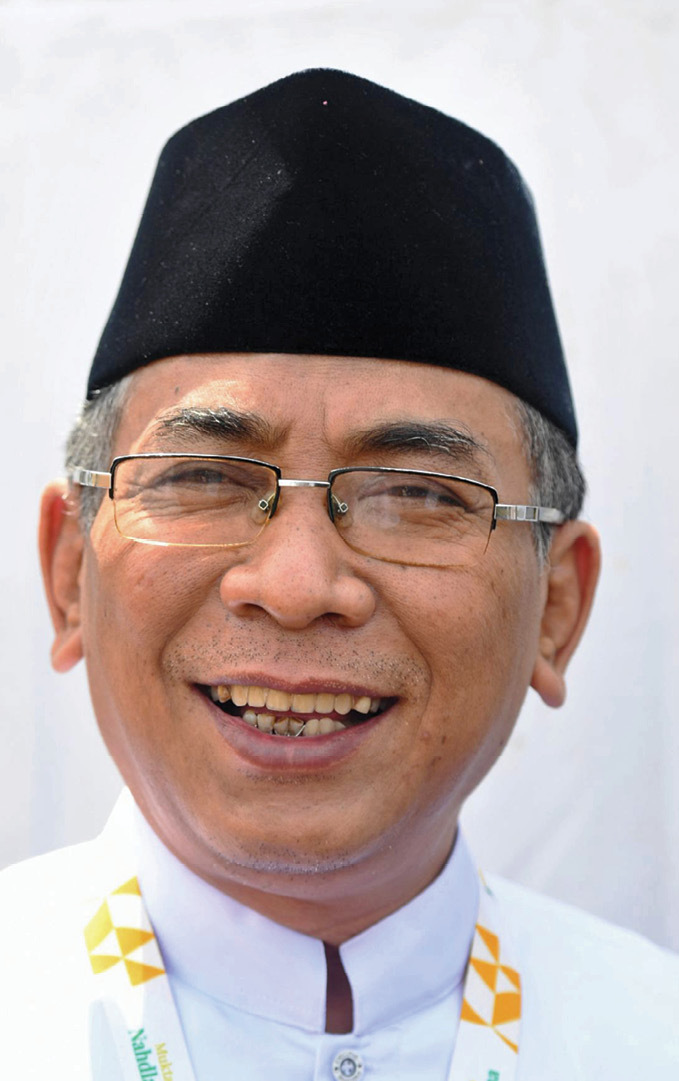Yahya Cholil Staquf serves as General Chairman of the Nahdlatul Ulama (NU) (“Awakening of Scholars”) Central Board. As the world’s largest Muslim organization—with over 90 million members and 21,000 madrasahs—the Nahdlatul Ulama adheres to the traditions of Sunni Islam, and teaches that the primary message of Islam is universal love and compassion.
Birth: 15 July 2025 (Age: 2025)
Source of Influence: Administration of Religious Affairs, Political
Influence: Leader of approximately 90 million members of the Nahdlatul Ulama
School of Thought: Traditional Sunni
Status: Featured in current year
Yahya Cholil Staquf serves as General Chairman of the Nahdlatul Ulama (NU) (“Awakening of Scholars”) Central Board. As the world’s largest Muslim organization—with over 90 million members and 21,000 madrasahs—the Nahdlatul Ulama adheres to the traditions of Sunni Islam, and teaches that the primary message of Islam is universal love and compassion.
Personal Education: Mr Staquf is descended from a long and illustrious line of Javanese ulema and was educated from earliest childhood in the formal and spiritual sciences of Islam. Mr Staquf later became a disciple of the venerated Islamic scholar and head of the NU Supreme Council, KH Ali Maksum (1915–1989), and of long-time NU Chairman and Indonesia’s first democratically elected head of state, KH Abdurrahman Wahid (1940–2009).
Head of Expansive Network: The Nahdlatul Ulama boasts an expansive network that covers 30 regions with 339 branches, 12 special branches, 2,630 representative councils and 37,125 sub-branch representative councils across Indonesia. This network practises the doctrine of Ahl Al-Sunnah wa Al-Jama’ah, meaning “people of the Sunnah (practices of the Prophet Muhammad) and the community”. They base their practices on the traditional sources of Islamic jurisprudence—mainly the Qur’an, hadith, and major schools of law. Among its aims are the propagation of Nahdlatul Ulama’s message and also an expansion of its already extensive network of members in Indonesia. This is the basis of many of the organization’s social reform efforts. With a solid structure of central and regional boards, branch and special branch boards, and various advisory councils, Staquf sits at the top of this influential Sunni movement.
Model of Traditionalism: With a mainly rural membership base, the Nahdlatul Ulama distinguishes itself from other Islamic organizations in Indonesia by positioning itself as a premier organization of traditional Islam—with an emphasis on education and political engagement based on Islamic principles.
Social Service: The Nahdlatul Ulama has made substantial charitable contributions to Indonesian society in the fields of educational development, healthcare, and poverty alleviation. Staquf, like his predecessors, propagates the Nahdlatul Ulama as an organization that is geared toward establishing a secular nation-state, based on a populace of modern and moderate Muslims—with agenda items such as anti-corruption laws and social-reform measures that are deeply rooted in Islamic principles.
Advisor: Staquf also served on HE President Joko Widodo’s Presidential Advisory Council, where he advised the President on religious, domestic and international affairs. Staquf co-founded the US-based organization Bayt ar-Rahmah li ad-Da‘wa al-Islamiyah Rahmatan li al-‘Alamin (The Home of Divine Grace for Revealing and Nurturing Islam as a Blessing for All Creation), and the Center for Shared Civilizational Values in 2021, both to serve as hubs for the expansion of Nahdlatul Ulama operations in North America, Europe and the Middle East. His work aims to bring the civilizational wisdom of Islam Nusantara to the global stage, countering harsh and violent interpretations of Islam.
“Religion is often used as a justification and even a weapon for conflict”
95 million members of Nahdlatul Ulama
98 years since Nahdlatul Ulama was founded.
News about Kyai Haji Yahya Cholil Staquf
- No approved news items yet.



